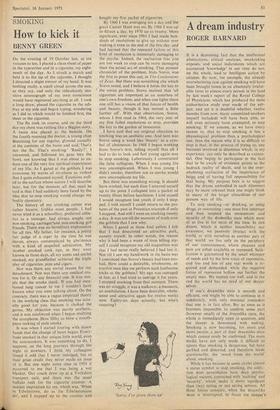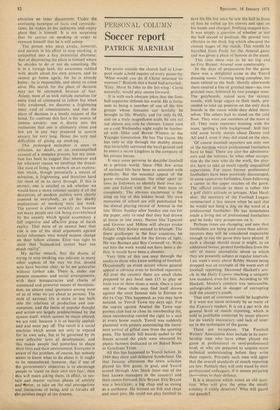A dream industry
ROGER BARNARD
It is a depressing fact that the intellectual abstractions, critical analyses, muckraking exposes, and social indictments which are accounted 'knowledge' in our time do not, on the whole, lead. to intelligent action by citizens. By now, for example, the already overwhelming case against smoking will have been brought home in an absolutely irrefut- able form to almost every person in the land by last week's report of the Royal College of Physicians,. which has produced the most authoritative study ever made of the sub- ject: and yet it is doubtful whether, twelve months from now, many committed smokers (myself included) will have been able, or will even seriously have attempted, to stop smoking. If we assume, as we have every reason to, that to stop smoking is less a physiological problem than a psychological one, then the reason why it is so difficult to stop is that, in the process of trying to, one becomes involved in dilemmas which, in my experience, can only be described as existen- tial. One begins to participate in the fact that to be aware of existence points to the bedrock reality of death, and to the over- whelming realisation of the importance of beipg and of having full responsibility for that being. My purpose here is to suggest that the drama embodied in such dilemmas may be more relevant than one might think to many of the larger absurdities of our present way of life.
To stop smoking—or drinking, or using drugs, or overeating—one must first interrupt and then suspend the momentum and security of the dreamlike state which most of us live in for most of the time. In this dream, which is neither insensibility nor awareness, we passively interact with the world, or with ourselves as another part of that world: we live only on the periphery of our consciousness, where pleasure and pain are either available or repressed. Satis- faction is guaranteed by the small whimper of needs and by the firm voice of repression, and less and less of any real worth is re- quired and demanded, while the negative forces of repression hollow out further the empty men. We repress too well, and in the end the world has no need of our deeper selves.
If one's dreamlike state is smooth and efficient, one might be able to continue in it indefinitely, with only minimal reminders that one is in fact alive. But as soon as it becomes impossible to confirm some part (however small) of the dreamlike state, the whole is immediately open to question, and the sleeper is threatened with waking. Smoking is now becoming, for more and more people, a part of their dreamlike state which cannot easily be confirmed. The mass media have not only made it difficult to ignore that smoking is dangerous, but have garbled and distorted, and therefore made questionable, the 'word from the world' about smoking.
While it has become in some circles almost a status symbol to stop smoking, the addic- tion does nevertheless have deep psycho- logical vectors, connected with 'sucking' and `security', which, make it more significant than (say) eating or not eating salmon. All these forces conspire, when the dreamlike state is interrupted, to focus the sleeper's
attention on inner discontents. Under the confusing harangue of facts and contradic- tions, he wakes to the unknown and empty place that is himself. It is not surprising that he carries on smoking in order to reassure himself that he is still asleep.
The person who stays awake, however, and persists in his effort to stop smoking, is catapulted into a key existential dilemma: that of discovering the place in himself where he decides to do or not do something. He is in a foreign land, his awareness riddled with doubt about his own powers, and he cannot go home again, for he is already home: he is responsible, and about to come alive. His search for the place of decision may not be attempted, because of fear. Asleep, most of us look outside ourselves for some kind of command to follow but when fully awakened, we discover a frightening inner void of consciousness, and that the place of decision is a lonely outpost of the mind. To confront this fact is the source of intense anxiety: one is drawn into the realisation that one is ultimately alone and few are in any way prepared to sustain anxiety for very long. Hence the very real difficulties of giving up smoking.
This prolonged metaphor is open to criticism, no doubt, as an oversimplified account of a complex process, but my inten- tion has been to suggest that whenever and for whatever reason we interrupt the dream- like state of living, we embark on an explora- tion which, though potentially a means of salvation, is frightening, and therefore hard for most of us to carry through. If this is correct, one is entitled to ask whether we would have a more rational society if all the deceptions of modern politics were clearly exposed to everybody, as all the deadly implications of smoking were last week. The answer is almost certainly no, because not many people can risk being overwhelmed by the anxiety which %Quid accompany a foil cognitive and affective grasp of harsh reality. That most of us cannot bear that risk is one of the chief arguments against social reformers who would impose change on their fellow citizens. Eliot was right to insist that 'humankind cannot bear too much reality'.
My earlier remark, that the drama of trying to stop smoking was relevant to many other aspects of the way we live, should now have become clear, so let me generalise without further ado. There is, under our present economic and social arrangements, with their bureaucracies and chains of command and powerful means of manipula- tion, an almost total ignorance among most of us of what we are about as persons. The style of national life is more or less built into the relations of production and con- sumption, and the limits of popular thought and action are largely predetermined by the system itself, which cannot be much altered, we are told, because it is so heavily capital- ised and must pay off. The result is a social machine which seems not only to expand for its own sake, but to be governed by its own inflexible laws of development, and this makes people feel powerless to shape their lives and their environment. Everyone is aware of the problem, of course, but nobody seems to know what to do about it. It ought to be remembered, however, that if one of the government's objectives is to encourage people to `stand on their own two feet', then this will mean asking them, 'in effect, to sus- tain and master various phases of anxiety and error, to take on the real prerogatives and limitations of being, and to forsake all the painless magic of the dreams.











































 Previous page
Previous page